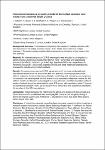International consensus on quality standards for multiple sclerosis care: results from a modified Delphi process
| dc.contributor.author | Hobart, J | |
| dc.contributor.author | Bowen, A | |
| dc.contributor.author | Eberhard, L | |
| dc.contributor.author | Pepper, G | |
| dc.contributor.author | Giovannoni, G | |
| dc.date.accessioned | 2023-05-24T09:54:55Z | |
| dc.date.available | 2023-05-24T09:54:55Z | |
| dc.date.issued | 2018-06 | |
| dc.identifier.uri | https://pearl.plymouth.ac.uk/handle/10026.1/20920 | |
| dc.description.abstract |
Background and aims: The importance of prompt intervention in multiple sclerosis (MS) was described in the widely endorsed report, Brain health: time matters in multiple sclerosis.1 The present study aimed to define standards for the timing of key steps in the care pathway. Methods: An international group of 29 MS neurologists was recruited to participate in a Delphi process. Across five rounds, they defined ‘core’, ‘achievable’ and ‘aspirational’ standards (to reflect a minimum, good and high standard of MS care, respectively). A Reviewing Group of 31 MS nurses, experts with MS and allied healthcare professionals reviewed the results and provided feedback. Results: Consensus was reached (≥75% agreement; n=21) on core, achievable and aspirational standards for 21 steps in the MS care pathway, covering symptom onset, referral, diagnosis, treatment decisions, lifestyle, monitoring, and managing new symptoms. For example, the panel agreed that MS teams should complete a diagnostic workup for MS within 2 months of referral to a neurologist as a core standard, and that completion within 4 weeks of referral should be achievable for most MS teams, with completion within 7 days as an aspirational standard. Here, we will present core, achievable and aspirational standards for key steps in the MS care pathway. Conclusion: These standards will inform tools for clinics and people with MS and act as a future benchmark for established and developing MS clinics across the globe aiming to deliver the highest quality care. Reference 1. Giovannoni G et al. Mult Scler Relat Disord 2016;9 Suppl 1:S5–S48. | |
| dc.title | International consensus on quality standards for multiple sclerosis care: results from a modified Delphi process | |
| dc.type | presentation | |
| plymouth.author-url | https://www.webofscience.com/api/gateway?GWVersion=2&SrcApp=PARTNER_APP&SrcAuth=LinksAMR&KeyUT=WOS:000435272002257&DestLinkType=FullRecord&DestApp=ALL_WOS&UsrCustomerID=11bb513d99f797142bcfeffcc58ea008 | |
| plymouth.organisational-group | |Plymouth | |
| plymouth.organisational-group | |Plymouth|Research Groups | |
| plymouth.organisational-group | |Plymouth|Faculty of Health | |
| plymouth.organisational-group | |Plymouth|Research Groups|Institute of Translational and Stratified Medicine (ITSMED) | |
| plymouth.organisational-group | |Plymouth|Research Groups|Institute of Translational and Stratified Medicine (ITSMED)|CCT&PS | |
| plymouth.organisational-group | |Plymouth|REF 2021 Researchers by UoA | |
| plymouth.organisational-group | |Plymouth|Users by role | |
| plymouth.organisational-group | |Plymouth|Users by role|Academics | |
| plymouth.organisational-group | |Plymouth|REF 2021 Researchers by UoA|UoA03 Allied Health Professions, Dentistry, Nursing and Pharmacy | |
| plymouth.organisational-group | |Plymouth|Faculty of Health|Peninsula Medical School | |
| dc.date.updated | 2023-05-24T09:54:54Z | |
| dc.rights.embargodate | 2023-5-25 |


